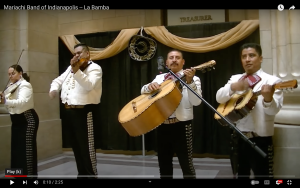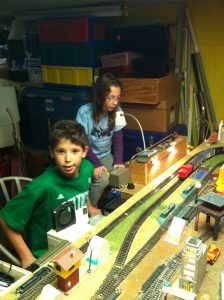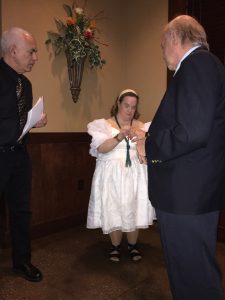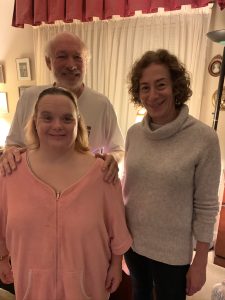
At the time my sister Laurel was born in 1965, babies like her were spoken of by doctors and other experts more typically as bringing a burden rather than a blessing to their families. No one would have dared to predict that she could live a life that in many important respects would parallel the lives of her four siblings. If someone had told Mom and Dad back then that, “the most painful element of parenting this daughter will arise when she decides, in her twenties, to attach herself to a boyfriend that you can’t stand,” it would have sounded like a cruel joke. Any kind of a boyfriend, even a bad one, would have sounded like a mad fantasy. This imagined prophecy, however, would turn out to be their reality.
Larry, will you take Laurel to be your lifelong partner? Will you love and respect her, be honest with her and stand by her, through whatever life may hold so you can genuinely share your life together?
Yet on a glorious winter day in December 2015, at a Mexican restaurant in downtown Indianapolis, my parents embraced the chance to leave behind those distressed feelings about the boyfriend and give their daughter a wonderful experience of triumph and autonomy. They had taken on and mostly succeeded in addressing so many challenges related to their daughter’s learning and development over many decades: her schooling, her summer camp and other recreational opportunities, her employment, her physical health. The fact that they managed, in their nineties, to overcome the disdain they previously felt for the boyfriend and to join in organizing this happy celebration was to me a high watermark for them as parents, as it surely was for my sister.
Good afternoon. My name is Dale Fink. As most of you know, Laurel has three brothers and one sister. I am the second oldest brother. I’ve also known Larry since Laurel and he first began spending time together, over 20 years ago.
I live in Massachusetts with my wife Betty and our son Jacob. It is exciting to know that members of the family have come not only from the East Coast but from California, Illinois, and Ohio to be part of this special occasion.
Those were the words I spoke as I welcomed the 30 to 35 guests. Laurel had asked if I would put together the plans and be the MC for their Commitment Ceremony. Like many people with disabilities, they would avoid marriage because it had the potential to reduce their Social Security and other benefits. I consulted some online sources and added some of my own ideas to create a ceremony. The Mexican restaurant was Laurel’s idea; she did not know that our brother Hugh had identified a local mariachi band that would entertain us after the ceremony. Larry and Laurel and many of the guests danced up a storm to the mariachi version of “Ring of Fire,” by Johnny Cash, and many other songs.
It had been a long journey to arrive at that special day: a fifty-year journey, from the morning when the doctors identified my sister as having Down Syndrome. No one dreamed then that this infant would grow up to be a woman who could live independently. The unscientific mythology around people with Down Syndrome (who were more commonly labeled as “retarded children” or even “mongoloids” back then) was that many of them would not even live to adulthood. We know now that the often-shortened lives were mostly a result of the cruel deprivations associated with institutionalization, not to the hazards of carrying an extra chromosome.
I always kept track of the longevity of Laurel’s relationship with Larry by comparing it to my own. When I met Betty in 1996, Laurel had already been with Larry for about three years. At the time of the ceremony—at which point Betty and I had been married for 17 years and had a son, aged fifteen—Larry and Laurel had been living together for well over 20 years.
I welcome all of you here today to bear witness with me to the lifelong partnership of Laurel and Larry. We are here not only to witness their commitment to each other, but also to wish them well and every happiness in their life together.
(Turning to face the couple): You have mastered the bus schedules together. You have gone to dances, to clubs. Laurel, you have made sure Larry takes his medications. Larry, you have made sure Laurel gets to her doctors’ appointments. You have played the DVD about “Mind your Manners” for your nieces and nephews.You have gone to the Indianapolis 500 parade. You have watched sports and movies on TV. You have invited friends over. And you have just hung out on your own, kicking back, heating up a pizza, and having a nice tall glass of Coke or lemonade on ice. You have done it all together.
There had been no courtship period. After they attended a couple of social events together, Laurel brought her toiletries and some suitcases full of clothing over to Larry’s house. That was the end of a failed experiment for her in living in an apartment with a roommate under the supervision of a disability-related social service agency. It was too far to walk from that shared apartment to Larry’s house, so I guess Laurel must have taken her belongings on the bus. She and Larry were always proud of their ability to navigate the buses all over the city of Indianapolis.
I never had the impression that Larry invited her to move in, or that they sat down and discussed it; she just did it. She had not previously dated—although she had tried, and I had helped her at times to reach out in person or on the phone to potential suitors. Most of the guys in her circle—those who were in her bowling league, those who attended dances and other events geared for the “special needs” community—lacked the competence to plan and execute outings or dates with the opposite sex without the help of their parents. The parents of that generation, in the 1980s and beyond, were mostly not ready to help with that element of human development. There had been one boy I will call “Billy” who epitomized the problem. Laurel had a crush on him for years. About a year before she met Larry, she was so excited that “Billy” was finally going to take her on a date. As a matter of fact, Billy was lining up a limousine to take her out for her birthday. He told her this one Saturday morning at bowling. She told me all about it on the telephone, and she got herself dressed and ready. Billy never came, never called, There was no limo; there was no date. I don’t even assume Billy remembered the pathetic promises he made to Laurel.
Larry, in contrast, was a guy who could deal. He owned a two-bedroom house that he had inherited from his mother when she died—his father having already been deceased for some years. He was a high school graduate who accumulated many of his academic credits in vocational classes, and he had really learned some skills. He was one of the few men I ever met who had managed to maintain a successfully running electric train set for decades, even adding new cars, engines, and tracks from time to time. He could pick up a discarded Video Cassette Recorder and get it working (muttering some magical incantations about the motherboard). He set up, wired, and periodically improved upon the outdoor lighting that came on automatically in his front yard during the hours of darkness and turned off in the morning.
Larry lived as a free and independent person without any services or supports from any agency. He had a full-time job as a maintenance man in a Food Court in a popular mall. When he told Laurel he would meet her at the Steak and Shake, he would be there. And the waitress already knew his name.
It is their wish today to declare their love and partnership before you all. It is a statement of a mutual relationship and commitment to each other. Laurel and Larry want to honor their relationship with a ceremony. Today we will dedicate our time to Laurel and Larry and the bond they have created and will continue to cherish.
My parents had given up Laurel to foster care in her earliest years, following the guidance they received from the most informed medical specialists as well as consultation with their Rabbi. As she turned three and four, she began to make increasingly frequent overnight and weekend visits to our family home, and at times even longer. My brother Leon and I were away in college, but Elaine and Hugh were still there. My parents realized they would happily bring her home fulltime but did not want to disrupt her strong connection to her devoted foster mother. That connection only ended when her other Mommy died of Hodgkin’s Lymphoma. She came home permanently at age six to “Mommy Fink” (that’s what she called her at the time) and the rest of our family.
Her foster mother had insisted that Laurel learn to eat and have proper table manners, to bathe and dress herself. I remember Mom telling me with admiration that Vera (the foster mother’s name) “would not permit Laurel to use the word can’t.” Vera set age-appropriate expectations and expected that Laurel would meet them. Now it was Mom’s turn. She helped Laurel work on some difficult speech sounds, making sure, for example, that Laurel could say mustard and not mushtard. She helped build on the groundwork Vera had laid in holding her responsible for her own self-care and hygiene, learning to pick out her own wardrobe each day. My parents’ support, along with the changing practices of the educational system would enable Laurel eventually to graduate from the same high school that Leon, Elaine, Hugh, and I attended—and in 1984 to be one of the first individuals with Down Syndrome in the whole state of Indiana to earn a high school diploma.
She moved from our family home to a group home a few years after she graduated from high school, but she chafed at the lack of independence. For instance, the staff of the group home arranged for all of them to be transported to play tennis. She knew that some of us in the family loved tennis, but it wasn’t her thing; why should she have to go?
My parents helped her move to the more independent situation with one female roommate in an apartment complex. It seemed like it was going all right, and she had a job at that time stocking shelves for Joanne’s Fabrics. But for her, there was something missing in her life. Ever since the disaster with Billy, she had been determined to find it somewhere. Larry had a girlfriend when she first met him. To this day, I am not clear on what tactics Laurel used to remove that obstacle and insinuate herself fully into Larry’s life.
After my opening remarks at the Commitment Ceremony, I passed out some slips of paper that I had prepared, with quotations from poetry, songs, films, and other sources. One of the women who worked with Laurel made sure that the people who received the slips were comfortable standing in front of the group to read them, and also competent to read them fluently. The readers included a couple of members of Larry’s family, a couple of Laurel’s peers with disabilities, and some neighbors and friends of my parents. Here are some of the quotes among my selection:
#3 It doesn’t matter if the guy is perfect or the girl is perfect. As long as they are perfect for each other. (From the film, GOOD WILL HUNTING)
#4 Only you can make this change in me
For it’s true, you are my destiny.
When you hold my hand, I understand
the magic that you do.
You’re my dream come true,
My one and only you. (The Platters)
We followed the participatory comments with an exchange of rings.
Larry, will you take Laurel to be your lifelong partner.
Will you love and respect her, be honest with her and stand by her, through whatever life may hold so you can genuinely share your life together?
(I will)Laurel, will you take Larry to be your life long partner. Will you love and respect him, be honest with him and stand by him, through whatever life may hold so you can genuinely share your life together?
(I will)Commitment is not a blind vow. It does not make every difficult situation sweet and easy. Even though you have made this commitment, there will still be disagreements at times. Conflicts at times. But making this commitment says to yourselves and the world that you will push past those conflicts and disagreements, and stay strong and stay together, and find a way back towards mutual respect and love.
Today is a celebration of your relationship. Everyone here wishes you continued happiness and we all hope that life will continue to hold the very best of everything for you. Congratulations to you both.
A loud burst of applause followed.
The entry of the mariachi band, in full beautiful costumes and sombreros, soon brought the party to another level. Everyone was having fun. Nobody danced as much as Larry and Laurel. If you have not had the pleasure of hearing a mariachi band play “Ring of Fire,” be sure to do yourself a favor and click the play button above.
The legendary Chicago Cubs shortstop, Ernie Banks, was famous for an old expression, back when there were a lot more double headers in Major League Baseball: “It’s a great day for baseball. Let’s play two.”
I was back in my home in the Berkshires, in the northwestern corner of Massachusetts when Laurel called a few days later. We had held the ceremony the day after Christmas and several of her friends had been unavailable. How would I feel if they organized another Commitment Ceremony for this additional group of people? Would I be able to print out and send them the script that I read, as well as the small bits of script to be passed out for those in attendance to read? One of the women who provided services to Laurel had already agreed to help organize it and do the officiating.
I happily agreed and put everything in the mail to her the next morning.
Her request let us all know, beyond the thanks she had already proffered, that we had done things right. We pulled off a successful commitment ceremony. Laurel had waited a long time to make such a commitment, and it was a great time for it. Let’s do it twice.
Dale Borman Fink retired in 2020 from Massachusetts College of Liberal Arts in North Adams, MA, where he taught courses related to research methods, early childhood education, special education, and children’s literature. Prior to that he was involved in childcare, after-school care, and support for the families of children with disabilities. Among his books are Making a Place for Kids with Disabilities (2000) Control the Climate, Not the Children: Discipline in School Age Care (1995), and a children’s book, Mr. Silver and Mrs. Gold (1980). In 2018, he edited a volume of his father's recollections, called SHOPKEEPER'S SON.






Thank you for sharing this beautiful story, Dale. I’m sure you understand from reading mine how much this touches me. I’m so glad your sister Laurel met and committed to Larry. They are so lucky to have found one another and the ceremony you created was perfect. It gives me hope that my granddaughter Daniella can someday have as meaningful and happy a life as your sister has.
Well done. Reads like a fairy tale come true allowing for the challenges of real life to be overcome by competence and cooperation and love. From your words I can understand and feel the success and gratitude you chose to share with the reading audience.
So much love and hope is woven into this tale. And for me, a memory.
One of my cousins on my Dad’s side (much older than I, because Dad was thirteen years older than Mom) had Down’s. She was not severely challenged – when I first met her (I was still a small child) I thought her merely wildly enthusiastic about The Beatles. My father simply described Helen as “different.” I am sure that she could have learned to live independently, but her parents would have none of that. They considered her congenitally helpless, damaged beyond repair and that was that.
I learned HOW different she was when we were sitting on her porch in Jersey City and a black guy walked by across the street. She saw him, shrieked in terror and ran inside. When I asked my Dad, he shook his head sadly and told me that her parents (I suspect that this was the brother he always described with words like “idiot” and “moron”) had taught her that black people like to kidnap and kill white girls. This was done to “keep her safe.”
I have no idea what happened to Helen; she’d be in her late 70s now, if still alive. I suspect that she lived her life in some sort of care facility after her parents died.
Thanks for sharing your story, Dave I am pleased that my parents, especially Mom (because he viewed decisions about us kids as her bailiwick)were part of the new wave, in some ways quite revolutionary, that wanted to restore full humanity to individuals with disabilities. It was parents of that WWII generation, together with disabled vets of that generation as well as Viet Nam generation disabled vets, plus polio survivors who really pushed that envelope and brought about a new paradigm in thinking about disability. We are all in their debt for expanding the realm of the possible and fully including us in society, recreation, employment and family life, whether we have mental health, hearing issues, mobility challenges, cognitive or any other barrier to what was viewed as “normal.”
What a lovely, heartwarming story Dale. I’m sure you know how lucky Laurel is to have you as her brother (and the rest of your family as well). The ceremony sounds truly wonderful, but she sounds quite impressive too. Thank you for brightening my day.
Wow! The story of Laurel and Larry so deserves this wonderfully written piece. My mind is whirling thinking of Laurel’s success and struggles and all the various supporters that she’s had in her life. It is life-affirming. Your account of the ceremony is very uplifting, and I am now humming Ring of Fire and wishing I could’ve attended at least one of the parties. Thank you and bravo, Dale!
Gavin, your enthusiastic feedback means a lot to me. I’m glad you have Ring of Fire in your head now and that you can associate that exciting and uplifting lyric and music with Larry’s and Laurels special day—or two.
You write well. More importantly, the story is moving, and interesting. How is Laurel doing these days?
One more thing, which you must know already: No quotes appear after this line:
“Here are some of the quotes among my selection:”.
I am guessing you read the story on a smart phone. I found out that some parts of some stories may not appear in that format. I have no idea why. If you look at the story on a tablet or laptop, you should see the entire narrative, including the quotations that were missing from your view.
Thanks for asking about Laurel. She is doing well, but Larry died during the pandemic–not of Covid 19. He was not a very physically healthy guy and one morning, he did not get up and she discovered he was unresponsive. She moved out of the house a month or two later (which he owned and it reverted to his cousin. She’s living in a large apartment building in a different neighbhorhood, near her (and my) old high school. I don’t know who ended up with the electric train set.